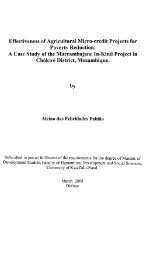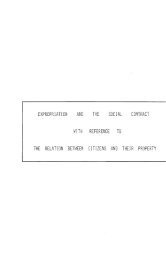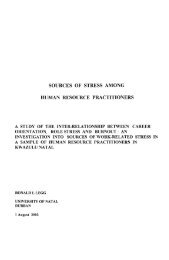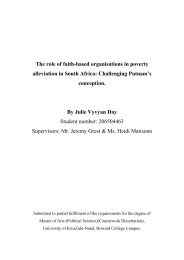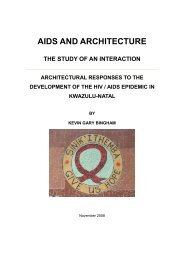View/Open - ResearchSpace - University of KwaZulu-Natal
View/Open - ResearchSpace - University of KwaZulu-Natal
View/Open - ResearchSpace - University of KwaZulu-Natal
Create successful ePaper yourself
Turn your PDF publications into a flip-book with our unique Google optimized e-Paper software.
patients could be affected because they could not receive the care that they need to prolong<br />
their lives:<br />
“Even going around houses helping people… it is not safe. I remember at one time we got to<br />
this house to check for this sick boy. Inside the house there were naked men smoking dagga.<br />
We just ran away because we were not safe... We like to see people getting well… when you<br />
go in and out <strong>of</strong> houses looking for this person who is supposed to be taking T.B<br />
medication…you would find people sitting and smoking, and the one you are looking for<br />
would be among them smoking. Then you will come in and call out his name… Maybe the<br />
person just responds by shouting at you, or he may respect you and come because <strong>of</strong> the tshirt<br />
you are wearing. He then asks you ‘how can I help you?’ I say yes, I’m looking for so<br />
and so, he says yes, that’s me. Then you would ask him why he no longer comes to fetch the<br />
medication. And they will swear at you. What can you say to that? You are taught to be<br />
patient and beg the person. Maybe you live far away and you came all the way to see that<br />
patient on foot, because they don’t pay us anything! So you have to walk long distances to get<br />
to the patient just one patient.” (Focus group 2, organisation B)<br />
Volunteer caregivers dealt with these challenges by ignoring such people. They continued to<br />
perform their work because they felt satisfied to <strong>of</strong>fer their help to sick people:<br />
“... we ignore such people because we know that there are people who need our help and<br />
they appreciate it and that is enough for us, but it is not that we are satisfied, we also need<br />
motivation in terms <strong>of</strong> money even just to buy things to work with like umbrellas or rain coats<br />
to use when it is raining, some warm clothing to protect us from the cold weather, uniforms<br />
for easy identification and even transport money.” (Focus group 3, organisation C)<br />
For those caregivers who came across dangerous gangs in the communities, they exercised<br />
patience with the person they were caring for and in some cases when they smelled danger<br />
they would opt to run for their lives:<br />
“Sometimes you can call the person aside, and see that they had been smoking dagga, they<br />
may listen to you when you motivate them and they end up accepting to go to the clinic. The<br />
next time you will find that the person has actually gone to the clinic to fetch their<br />
medication. They continue taking medication. They may even come to you and say ‘thank you<br />
my sister for helping me.” (Focus group 2, organisation B)<br />
59





